
INTERNATIONAL JOURNAL OF LIFE CYCLE ASSESSMENT
Scope & Guideline
Exploring the depths of environmental impact assessment.
Introduction
Aims and Scopes
- Life Cycle Sustainability Assessment (LCSA):
A core area of research that integrates environmental, economic, and social dimensions to assess the sustainability of products and processes over their entire life cycle. - Social Life Cycle Assessment (S-LCA):
A focus on evaluating the social impacts of products and services, considering aspects such as labor rights, community impacts, and stakeholder engagement. - Methodological Innovations in LCA:
Development and refinement of methodologies for LCA, including new impact assessment methods, inventory approaches, and data management techniques. - Sector-Specific Assessments:
Application of LCA in various sectors including agriculture, construction, energy, and manufacturing, exploring unique challenges and opportunities for sustainability. - Integration of Emerging Technologies:
Exploration of how new technologies such as blockchain, artificial intelligence, and digital tools can enhance LCA practices and sustainability assessments. - Circular Economy Strategies:
Research on how life cycle assessment can support the transition to circular economy models, focusing on resource efficiency and waste reduction.
Trending and Emerging
- Integration of Digital Tools and Data Management:
The use of advanced digital tools, such as blockchain and AI, to enhance data transparency, traceability, and efficiency in LCA is gaining significant attention. - Focus on Circular Economy and Resource Efficiency:
An increasing number of studies are addressing how LCA can facilitate the shift to circular economy models, emphasizing strategies for reducing waste and enhancing resource reuse. - Social Dimensions of Sustainability:
There is a growing emphasis on S-LCA and the social impacts of products and processes, reflecting a broader recognition of the importance of social factors in sustainability assessments. - Climate Change Mitigation Strategies:
Research is increasingly focused on assessing the impacts of various strategies for mitigating climate change, including renewable energy systems and sustainable agricultural practices. - Food Systems and Agricultural Assessments:
A notable trend in publications is the assessment of food systems, including the environmental and social impacts of various agricultural practices and products. - Emerging Materials and Technologies:
Studies exploring the life cycle impacts of new materials (e.g., bioplastics, alternative proteins) and technologies (e.g., 3D printing, renewable energy systems) are on the rise.
Declining or Waning
- Traditional Environmental Impact Assessments:
There is a noticeable decline in standalone environmental impact assessments that do not integrate social or economic factors, as the field increasingly embraces holistic approaches. - Basic Life Cycle Inventory Methods:
Research focused solely on inventory data collection methods is becoming less frequent, as the emphasis shifts toward integrated approaches that combine inventory with impact assessment. - Single-Aspect Assessments:
Studies that evaluate only one dimension of sustainability (e.g., environmental impacts without considering social or economic factors) are decreasing, as comprehensive assessments gain traction. - Geographically Limited Studies:
Research confined to specific local contexts without broader implications is less prevalent, as there is a growing push for studies that have global relevance or can inform policy at larger scales.
Similar Journals

Detritus
Exploring the intersection of chemistry and environmental stewardship.Detritus, an esteemed open-access journal published by CISA PUBLISHER since 2018, serves as a vital platform for the dissemination of innovative research in the fields of Environmental Chemistry, Environmental Engineering, and Waste Management and Disposal. Based in Padova, Italy, the journal aims to foster scholarly communication and collaboration among researchers, professionals, and students dedicated to advancing our understanding of environmental challenges and solutions. With its open-access model, Detritus ensures that high-quality research is freely available, bridging the information gap within the scientific community. While currently categorized in the Q3 quartile across multiple environmental science disciplines, the journal is poised to further enhance its visibility and impact, contributing significantly to pressing global issues such as waste reduction and sustainable resource management. As the journal continues to evolve, it encourages submissions that advance theory and application in these critical areas.
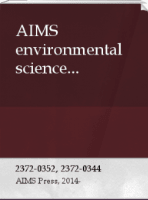
AIMS Environmental Science
Empowering Research Through Open Access InnovationAIMS Environmental Science is a reputable peer-reviewed journal dedicated to advancing our understanding of environmental science through rigorous research and innovative methodologies. Published by the American Institute of Mathematical Sciences (AIMS), this journal provides an essential platform for researchers, professionals, and students alike, offering open access to cutting-edge studies since its establishment in 2014. With an ISSN of 2372-0344 and an E-ISSN of 2372-0352, it serves a global audience from its base in the United States. As part of the Scopus rankings, the journal is positioned in the third quartile (Q3) for the field of Environmental Science, showcasing its emerging role in the community with a ranking of 114 out of 233 in General Environmental Science, placing it in the 51st percentile. From 2015 to 2024, the journal focuses on a broad range of topics within environmental science, aiming to bridge gaps between theoretical research and practical application. By providing open access to its content, AIMS Environmental Science ensures that vital environmental research is accessible to a wider audience, fostering collaboration and innovation in tackling some of the most pressing environmental issues of our time.
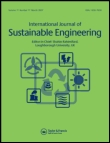
International Journal of Sustainable Engineering
Connecting research and innovation for a greener tomorrow.Welcome to the International Journal of Sustainable Engineering, an esteemed publication within the field of engineering, dedicated to advancing the principles of sustainability in design and technology. Published by Taylor & Francis Ltd, this Open Access journal, available since 2022, provides a platform for high-quality research that addresses the challenges of sustainable engineering across diverse sectors. Based in the United Kingdom, the journal enjoys a distinguished reputation, reflected in its impressive Q1 status in the Engineering (miscellaneous) category and a notable Scopus rank of #35 out of 307, placing it in the top 88th percentile of its field. With a timeline of publications from 2008 to 2024, the International Journal of Sustainable Engineering serves as a vital resource for researchers, professionals, and students seeking to engage with innovative solutions that promote sustainability in engineering practices. We invite you to contribute to this critical discourse and explore the wealth of knowledge presented in our journal.
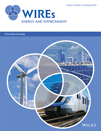
Wiley Interdisciplinary Reviews-Energy and Environment
Shaping the dialogue on energy and environment.Wiley Interdisciplinary Reviews: Energy and Environment, published by Wiley Periodicals, Inc., stands as a leading platform for interdisciplinary research at the intersection of energy and environmental sciences. With a commendable impact factor and prestigious rankings—Q1 in both Environmental Science and Renewable Energy, Sustainability and the Environment—the journal has solidified its position in the academic community, ranked #22 out of 233 in General Environmental Science and #46 out of 270 in Renewable Energy. This journal aims to advance understanding and foster innovative solutions to pressing global challenges such as climate change, energy efficiency, and sustainability issues. Researchers and professionals alike are encouraged to explore the journal’s extensive range of articles, which contribute to a significant body of knowledge and support informed decision-making in policy and practice. Please note that the journal is not open access, providing content through institutional subscriptions and individual purchase options. Operating from its base in the United Kingdom, the journal maintains an impressive convergence of knowledge from 2012 to 2024, encouraging contributions from a diverse range of disciplines to address critical energy and environmental challenges.
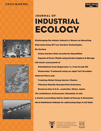
JOURNAL OF INDUSTRIAL ECOLOGY
Advancing Sustainable Solutions for Industrial PracticesJOURNAL OF INDUSTRIAL ECOLOGY, published by Wiley, is a leading academic journal that focuses on the intersection of industrial practices and ecological sustainability. With an ISSN of 1088-1980 and an E-ISSN of 1530-9290, this journal has established itself as a premier outlet for research in economic, environmental, and social sciences, evidenced by its Q1 rankings in key categories such as Economics and Econometrics, Environmental Science, and General Social Sciences as of 2023. Spanning over two decades from 1997 to 2024, it offers invaluable insights into innovative approaches for designing sustainable industrial systems, informing policy decisions, and advancing interdisciplinary collaborations. While the journal does not currently offer open access options, its high impact in the field—illustrated by its impressive Scopus rankings, where it ranks 5th among 275 in General Social Sciences and 23rd among 233 in General Environmental Science—reinforces its importance to researchers, professionals, and students dedicated to the principles of sustainable development and industrial ecology.
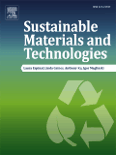
Sustainable Materials and Technologies
Unlocking Potential through Sustainable EngineeringSustainable Materials and Technologies is an esteemed journal published by Elsevier, focusing on pioneering research and innovative solutions in the fields of industrial engineering, materials science, and environmental sustainability. With a prestigious Q1 ranking in multiple relevant categories—including Industrial and Manufacturing Engineering, Materials Science, Renewable Energy, Sustainability, and Waste Management—this journal is positioned as a leading platform for disseminating high-impact research that addresses pressing challenges in material sustainability. Recognized for its rigorous peer-review process and commitment to academic excellence, Sustainable Materials and Technologies is dedicated to providing open access to groundbreaking studies and practical methodologies that drive forward the agenda for a sustainable future. Since its inception in 2014, the journal has been integral for professionals, researchers, and students who are engaged in the quest for innovative materials and technologies that minimize ecological footprints. Join a community at the forefront of sustainability science by contributing to and engaging with the transformative research published in this pivotal journal.
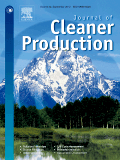
Journal of Cleaner Production
Catalyzing Change for a Cleaner, Greener PlanetThe Journal of Cleaner Production, published by Elsevier Science Ltd, is a leading interdisciplinary journal dedicated to the development and dissemination of knowledge on environmental sustainability and cleaner production practices. With an impact factor that reflects its high relevance in the field, the journal is recognized as a Q1 publication in key categories including Environmental Science, Industrial and Manufacturing Engineering, Renewable Energy, and Strategy and Management as of 2023. This prestigious journal has been a platform for groundbreaking research since its inception in 1993 and continues to shape the dialogue around sustainable practices in various sectors. Researchers and professionals across disciplines can access its wealth of insights, which are critical for driving the transition towards more sustainable production and consumption models. The journal’s rigorous peer-review process ensures that only high-quality research is published, making it an essential resource for academics, industry leaders, and policymakers committed to advancing cleaner production methodologies.

Biofuels-UK
Fostering critical discussions on energy, environment, and sustainability.Biofuels-UK is a leading academic journal dedicated to the exploration of renewable energy sources, particularly focusing on biofuels and their sustainable applications. Since its inception in 2009 and published by TAYLOR & FRANCIS LTD, this journal has served as a vital platform for researchers, professionals, and students interested in the intersection of energy, environmental sustainability, and waste management. With an impact factor indicative of its scientific significance, Biofuels-UK is categorized in the Q3 quartile for both Renewable Energy, Sustainability and the Environment, and Waste Management and Disposal as of 2023. With a Scopus ranking that positions it among the top environmental journals, it facilitates the dissemination of high-quality research, critical discussions, and innovative solutions in the field. Although it remains a subscription-based journal, its commitment to advancing knowledge in biofuels and sustainability makes it a cornerstone resource for anyone aspiring to contribute to this essential sector of modern science.

Clean Technologies and Environmental Policy
Innovating policies for a cleaner, healthier planet.Clean Technologies and Environmental Policy is a prestigious journal published by Springer, dedicated to advancing the field of environmental science through the lens of sustainable technology and policy-making. Since its inception in 2004, the journal has carved out a significant niche within the academic community, boasting an impressive impact factor reflective of its quality, as evidenced by its ranking in the Q1 and Q2 categories across various disciplines, including Environmental Engineering and Business, Management and Accounting. With a focus on innovative approaches to managing environmental challenges, the journal covers a wide array of topics from management strategies in environmental engineering to methodologies in policy development. This comprehensive scope positions it as an essential resource for researchers, professionals, and students seeking to contribute to the dialogue on sustainable development and environmental stewardship. Although it operates without Open Access, the journal ensures rigorous peer review and timely publication of high-quality research, facilitating the dissemination of knowledge necessary for informed decision-making in the ever-evolving field of environmental science.

MRS Energy & Sustainability
Catalyzing Change in Energy Systems and SustainabilityMRS Energy & Sustainability is a premier interdisciplinary journal published by SpringerNature, focusing on advancing the understanding of energy systems and sustainability within the context of materials science and engineering. Since its inception in 2014, this journal has rapidly gained recognition in the academic landscape, achieving impressive rankings including Q1 in Electronic, Optical and Magnetic Materials and Mechanics of Materials, and Q2 in Energy Engineering and Power Technology as well as Renewable Energy, Sustainability and the Environment, as of 2023. The journal's ISSN is 2329-2229 and E-ISSN is 2329-2237. With a commitment to open access, it provides researchers and professionals with the latest findings and insights essential for guiding innovations in energy solutions and sustainable practices. The journal's global reach and high-impact reputation make it an invaluable resource for scientists, engineers, and policymakers dedicated to addressing the contemporary challenges of energy and sustainability. With a diverse scope and high Scopus rankings, MRS Energy & Sustainability continues to be at the forefront of research that shapes our energy future.